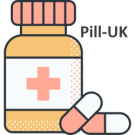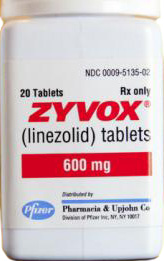Anyone familiar with chilblains knows that it is not only an aesthetic problem, but also an infectious disease that is accompanied by intoxication and can lead to complications, up to sepsis. The disease is caused by a group of streptococci which are effectively treated with Zyvox. This synthetic antibacterial agent, which belongs to the antimicrobial class, has long been tested in United Kingdom for the treatment of several serious diseases. Which ones? To find out more, see below.
We recommend buying this medicine in our online pharmacy. You will be satisfied not only with the price and fast delivery to any region of United Kingdom, but also with the possibility to order the medicine without a prescription.
What is Zyvox and why is it used?
Zyvox is a formidable weapon in the fight against serious diseases, and where others fail, the product’s active ingredient, linezolid, which works against Gram-positive and some Gram-negative aerobic bacteria, will save the day.
It is effective in the treatment of inpatient and outpatient pneumonia, some urinary tract infections, skin infections, and may even help with some complications of diabetes mellitus.
Indications for use of Zyvox
The product is indicated for the treatment of infections caused by sensitive strains of Gram-positive anaerobic or aerobic microorganisms accompanied by bacteraemia. Such conditions include:
- Nosocomial (hospital-acquired) pneumonia (pneumonia that develops 48-72 hours after hospital admission and was not present or incubating prior to admission);
- non-hospital-acquired pneumonia (occurs when the infection occurs in an out-of-hospital setting or later than 4 weeks after hospital discharge or when the disease develops in the first 48 hours of hospitalisation)
- complicated infections of the skin and its structures, in particular diabetic foot infections (one of the severe complications of diabetes, pathological changes in the feet in the form of ulcers, bone and joint lesions, loss of skin sensation) without accompanying osteomyelitis (inflammatory bone-destroying disease caused by bacteria, mycobacteria or fungi)
- uncomplicated infections of the skin and its structures (boils, scabies, erysipeloid);
- enterococcal infections (endocarditis, urinary tract infections, prostatitis, intra-abdominal infections).
Contraindications To The Use Of Zyvox
There are clearly defined contraindications to the use of Zyvox. One of the most serious contraindications is allergy to the active substance linezolid or to other excipients.
Do not take the medicine in case of uncontrolled high blood pressure, renal or hepatic insufficiency, bipolar depression, schizoaffective disorder, acute episodes of vertigo, pheochromocytoma (a tumour formed by chromaffin cells and usually located in the adrenal glands), carcinoid (a slow-growing type of lung cancer), thyrotoxicosis (increased production of thyroid hormones).
Avoid taking the medicine during pregnancy and breast-feeding.
It should also be remembered that Zyvox should not be taken simultaneously with phenelzine and isocarboxazid. Before starting treatment, tell your doctor about all the medicines you are taking and any medical conditions you have. This will help the doctor decide on the appropriate regimen and duration of treatment.
Side effects
When taking antibiotics, adverse reactions cannot always be avoided by the body. Some occur more frequently, some less frequently, in which case you should consult your doctor.
Common: candida, fungal infections, diarrhoea, nausea, vomiting, metallic taste, headaches.
Rare: insomnia, visual disturbances, tinnitus, dizziness, hypoaesthesia, paraesthesia, constipation, dry mouth, dyspepsia, gastritis, loose stools, pancreatitis, stomatitis, tongue discomfort or discolouration, fever, fatigue, dermatitis, increased sweating, pruritus, rash, urticaria, vaginitis.
Dosage and Administration
The tablets are taken orally with plenty of water. It can be taken with a meal or between meals. It is usually prescribed twice daily.
Only your doctor can determine the daily dose of the medicine and the duration of treatment. Adhere to the doctor’s prescription and follow the entire course of treatment, as the disappearance of symptoms does not mean that the infection is cured. Insufficient duration of treatment may lead to a recurrence of the infection.


